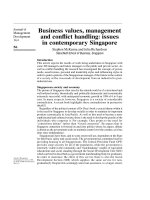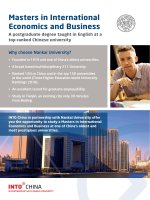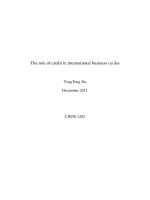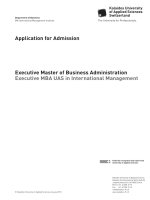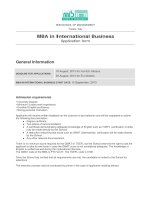Managerial issues in international business
Bạn đang xem bản rút gọn của tài liệu. Xem và tải ngay bản đầy đủ của tài liệu tại đây (976.22 KB, 234 trang )
Managerial Issues in
International Business
Edited by
Felicia M. Fai and Eleanor J. Morgan
Managerial Issues in International Business
THE ACADEMY OF INTERNATIONAL BUSINESS
Published in association with the UK Chapter of the Academy of International Business
Titles already published in the series:
International Business and Europe in Transition (Volume 1)
Edited by Fred Burton, Mo Yamin and Stephen Young
Internationalisation Strategies (Volume 2)
Edited by George Chryssochoidis, Carla Millar and Jeremy Clegg
The Strategy and Organization of International Business (Volume 3)
Edited by Peter Buckley, Fred Burton and Hafiz Mirza
Internationalization: Process, Context and Markets (Volume 4)
Edited by Graham Hooley, Ray Loveridge and David Wilson
International Business Organization (Volume 5)
Edited by Fred Burton, Malcolm Chapman and Adam Cross
International Business: Emerging Issues and Emerging Markets (Volume 6)
Edited by Carla C.J.M. Millar, Robert M. Grant and Chong Ju Choi
International Business: European Dimensions (Volume 7)
Edited by Michael D. Hughes and James H. Taggart
Multinationals in a New Era: International Strategy and Management (Volume 8)
Edited by James H. Taggart, Maureen Berry and Michael McDermott
International Business (Volume 9)
Edited by Frank McDonald, Heinz Tüselmann and Colin Wheeler
Internationalization: Firm Strategies and Management (Volume 10)
Edited by Colin Wheeler, Frank McDonald and Irene Greaves
The Process of Internationalization (Volume 11)
Edited by Frank McDonald, Michael Mayer and Trevor Buck
International Business in an Enlarging Europe (Volume 12)
Edited by Trevor Morrow, Sharon Loane, Jim Bell and Colin Wheeler
Managerial Issues in International Business (Volume 13)
Edited by Felicia M. Fai and Eleanor J. Morgan
Managerial Issues in
International Business
Edited by
Felicia M. Fai
and
Eleanor J. Morgan
School of Management, University of Bath, UK
Selection and editorial matter © Felicia M. Fai and Eleanor J. Morgan 2006
Foreword © Jeremy Clegg 2006
Individual chapters © the contributors 2006
All rights reserved. No reproduction, copy or transmission of this
publication may be made without written permission.
No paragraph of this publication may be reproduced, copied or transmitted
save with written permission or in accordance with the provisions of the
Copyright, Designs and Patents Act 1988, or under the terms of any licence
permitting limited copying issued by the Copyright Licensing Agency,
90 Tottenham Court Road, London W1T 4LP.
Any person who does any unauthorised act in relation to this publication
may be liable to criminal prosecution and civil claims for damages.
The authors have asserted their rights to be identified
as the authors of this work in accordance with the Copyright,
Designs and Patents Act 1988.
First published 2006 by
PALGRAVE MACMILLAN
Houndmills, Basingstoke, Hampshire RG21 6XS and
175 Fifth Avenue, New York, N.Y. 10010
Companies and representatives throughout the world
PALGRAVE MACMILLAN is the global academic imprint of the Palgrave
Macmillan division of St. Martin’s Press, LLC and of Palgrave Macmillan Ltd.
Macmillan® is a registered trademark in the United States, United Kingdom
and other countries. Palgrave is a registered trademark in the European
Union and other countries.
ISBN-13: 978–0–230–00193–0 hardback
ISBN-10: 0–230–00193–9 hardback
This book is printed on paper suitable for recycling and made from fully
managed and sustained forest sources.
A catalogue record for this book is available from the British Library.
Library of Congress Cataloging-in-Publication Data
Academy of International Business. UK Chapter. Conference (32nd : 2005 : University
of Bath, School of Management)
Managerial issues in international business / edited by Felicia M. Fai &
Eleanor J. Morgan.
p. cm. — (Academy of International Business)
Selection of papers from the 32nd Annual Conference of the UK Chapter of the
Academy of International Business, held April 8–9, 2005 at University of Bath,
School of Management.
Includes bibliographical references and index.
ISBN 0–230–00193–9
1. International business enterprises—Management—Congresses. I. Fai,
Felicia M., 1971– II. Morgan, Eleanor J. III. Title. IV. Academy of
International Business (Series) (Palgrave Macmillan (Firm))
HD62.4.A223 2005
658′.049—dc22
2005057504
10
15
9
14
8
13
7
12
6
11
5
10
4
09
3
08
2
07
1
06
Printed and bound in Great Britain by
Antony Rowe Ltd, Chippenham and Eastbourne
Contents
List of Tables
vii
List of Figures
viii
Foreword by Jeremy Clegg
ix
Notes on the Contributors
xi
1 Managerial Issues in International Business: Introduction
Felicia M. Fai and Eleanor J. Morgan
2 The Relevance of Internationalization Theories: a Contingency
Framework
Carl Arthur Solberg and Vidar Askeland
3 Cheating and Incentive Schemes in International Joint Ventures
Ursula F. Ott
4 Managerial Perspectives on Business Purpose: Values, National
Values and Institutions
Simon Harris and Chris Carr
5 A New Perspective on Parenting Spin-offs for Cluster Formation
Manuel P. Ferreira, William Hesterly and
Ana Teresa Tavares
6 Towards an Explanation of MNE FDI in the City of London
Financial Services Cluster
Naresh R. Pandit, Gary A.S. Cook and
Pervez N. Ghauri
7 International Entrepreneurship and Managing Network
Dynamics: SMEs in the UK Advertising Sector
Dev K. Boojihawon
8 Cross-border Management Issues in International Law Firms
Susan Segal-Horn and Alison Dean
9 The Performance Management–Training Interface in
Australian Firms in China
Susan McGrath-Champ and Xiaohua Yang
v
1
9
33
50
67
85
102
123
141
vi
Contents
10 Country of Origin Effects on Knowledge Transfers from MNEs
to their Chinese Suppliers: an Exploratory Investigation
Jing-Lin Duanmu
162
11 Foreign Direct Investment Flows into an Integrating
Europe: MNE Strategy and Location Decisions, 1981–2001
Dimitra Dimitropoulou and Robert Pearce
180
12 New Directions in International Business
Simon Collinson, Peter Buckley, John Dunning and George Yip
195
Index
208
List of Tables
3.1
3.2
3.3
3.4
4.1
4.2
6.1
6.2
8.1
9.1
9.2
9.3
10.1
11.1
11.2
12.1
Definitions of cheating, broadly defined, and examples
Corruption perception index (CPI) and bribe payer’s index (BPI)
Cheating at work in relation to Hofstede’s dimensions
Sabotage and learning
National values orientations and expectations for stakeholders,
aims and time frames in six nations
Congruence between national values and case study observations
General advantages of a City of London location
The importance of close proximity to other firms
The seven managerial challenges
Company profiles
Expatriate profiles
Performance management (PM) components
Composition of firms interviewed
FDI inflows by origin; number of observations in each panel
Regression results, one-way FE and POLS
Multidimensional framework for investigating broad
themes – an example
vii
36
39
40
47
54
62
93
95
129
149
150
156
168
184
188
202
List of Figures
2.1
2.2
3.1
4.1
6.1
7.1
7.2
7.3
7.4
9.1
10.1
12.1
Framework for classifying internationalization theories
Trajectories of case firms within the framework
Power distance in relation to individualism and masculinity
Broad analytical model of factors underlying strategic decisions
The London financial services cluster
International entrepreneurship and network dynamics:
a conceptual framework
AccentUK
Contactpoint
Finewaters
Model of cross-cultural training and performance management
Knowledge transfer intensity and relationship development
Rigour and relevance in international business
viii
10
20
39
53
89
108
112
114
116
147
169
196
Foreword
This is the thirteenth volume to be published by Palgrave Macmillan in the
series of selected papers from the annual conference of the Academy of International Business (AIB), United Kingdom Chapter. The 32nd Annual Conference,
on which this volume is based, was held at the School of Management,
University of Bath on Friday 8 and Saturday 9 April 2005, organized by the
joint conference chairs, Eleanor Morgan and Felicia Fai. The conference
achieved a new record in terms of the number of submissions and in terms of
the overall quality of papers presented: 79 papers were accepted for the conference
sessions and 24 students presented their research to panels of experts at the
doctoral colloquium.
The study of international business in the UK has, rather fittingly, become
increasingly international in recent years. This was clearly evident at the Bath
conference, where there were over 170 participants, of which 58 delegates
(staff and research students) came from academic institutions in 21 countries
outside the UK; indeed the challenges faced by those involved in international
business, whether as academics or as practitioners, are universal. John
Dunning, in a powerful contribution at the conference, highlighted ways in
which international business links to the major economic and welfare challenges
faced in the world. In drawing this volume together, the editors have focused
on managerial issues; each of the chapters connects to these challenges in
some way, while addressing issues that affect management in the process of
wealth creation.
Research in the field of international business is conducted on a number of
levels, from the micro to the macro. As international business comes to occupy
a progressively greater role in the creation of wealth, so its impacts and potential
impacts on social and welfare issues necessarily become greater. Thus, cultural
difference matters within multinational firms as well as between countries,
for business as well as economic performance and development. The internationalization of industries that customarily have been domestically focused,
notably the service industries, is important for growth. The quality of entrepreneurship and management is critical for the performance of these firms and
the countries that they unite through their activities. Issues such as these, and
many more, are investigated in this stimulating volume arising from an
outstanding conference. A further selection of the best papers from the
conference will be published in a special issue of Management International
ix
x
Foreword
Review, edited by Eleanor Morgan and Felicia Fai. All of this serves to underline
the vibrant state of research in international business in the United Kingdom
and its international calibre.
Jeremy Clegg
Chair, Academy of International Business
United Kingdom Chapter
Notes on the Contributors
Vidar Askeland recently graduated from the BI Norwegian School of Management,
Oslo, with an MSc in International Business. He previously graduated from
BI with a Master in Business and Economics, and EDHEC, France with a Master’s
in European Business. His research and theses have primarily been aimed at
theories of internationalization, and particularly on entry modes. He is
currently working in the telecommunications sector.
Dev K. Boojihawon is a Lecturer in Strategic Management at the Marketing
and Strategy Research Unit, Business School, Open University, UK. He
obtained his PhD from the University of Strathclyde, Glasgow, in international
strategy in professional service firms. His current research interests lie in the
area of international strategy process in multinational subsidiaries, international entrepreneurship, and international strategy of firms in developing
countries. Dev has made various contributions to academic conferences in
international business and strategic management and has ongoing interests in
developing further research in these areas.
Peter Buckley is Professor of International Business and Director of the
Centre for International Business, University of Leeds (CIBUL), UK, visiting
Professor at the universities of Groningen (The Netherlands) and Reading (UK)
and Honorary Professor at the University of International Business and
Economics, Beijing, China. He has published 22 books and over 120 articles in
highly respected international journals. The Social Science Citation Index lists
over 1100 citations to his work. He is a Fellow of the British Academy of
Management and a Fellow of the Royal Society of Arts (RSA). He was elected a
Fellow of the Academy of International Business in 1985 for ‘outstanding
achievements in international business’ and was its Vice-President in 1991–92
and President from 2002 to 2004.
Chris Carr MA (Cantab), D.Phil (Warwick), DMS, ACMA, CEng, MIMechE is
Professor in Corporate Strategy at University of Edinburgh, UK. Previously a
senior lecturer at Manchester Business School, following lectureships at
Buckingham, Warwick and Bath universities, he has spent 25 years researching
strategic approaches to globalization, comparing some 20 countries worldwide
through extensive field research particularly in the vehicle components
industry. Prior to this he worked in industry for over ten years with British
Aerospace and then GKN. He has published two books, Britain’s Competitiveness
xi
xii
Notes on the Contributors
(Routledge, 1990) and Strategic Investment Decisions (Avebury, 1994) and
extensively in academic journals, including the Journal of Management Studies
and the Strategic Management Journal.
Simon Collinson is Senior Lecturer in International Business at Warwick
Business School, University of Warwick (UK) and a Ghoshal Fellow in the UK
ESRC’s Advanced Institute of Management Research (AIM). He was previously
Assistant Director at the JETS Institute, Edinburgh University, and has held
visiting positions at NISTEP in Tokyo under a Royal Society Fellowship, at the
AGSM in Sydney and at the Kelley School of Business, Indiana University. He
has published in the areas of comparative organization studies; the constraints
on corporate internationalization; the global organization of R&D, innovation,
knowledge and technology management; international entrepreneurship and
business infrastructures and management practices in Japan and China.
Gary Cook is Senior Lecturer in Applied Economics at the University of
Liverpool Management School, UK and Visiting Fellow in Economics at
Manchester Business School, UK. He obtained his PhD from Manchester Business
School in the area of vertical integration strategies and contractual relationships. His current research interests lie in the areas of industrial clustering, with
particular emphasis on the broadcasting and financial services industries, and
corporate insolvency, particularly the rescue of financially distressed small and
medium-sized enterprises. Gary has published widely and made numerous
conference contributions in both areas.
Alison Dean is Lecturer in Strategic Management at Kent Business School, University of Kent, UK. She obtained her PhD from the University of Massachusetts,
Amherst, in industrial organization and economic history, considering post-war
change in the UK brewing industry. Her current research interests lie in the
impact of change on firms’ behaviour and strategy, in the contexts of professional service firms and the management of innovation. She has contributed to
academic conferences in strategy and organization studies on such topics as
managing change in the wake of privatization, using an options approach to
encourage innovation, and the globalization of legal service firms. Her articles
have appeared in such journals as the Review of Industrial Organization, British
Journal of Management and Creativity and Innovation Management.
Dimitra Dimitropoulou is a PhD student at the University of Reading Business
School completing her thesis on FDI and European Union countries.
Jing Lin Duanmu is a PhD student at the School of Management, University of
Bath, UK. Her thesis is a qualitative analysis of inward invested multinational
Notes on the Contributors
xiii
subsidiaries in China and the development of their relationship with indigenous
Chinese suppliers in the electrical/electronic industry in Wuxi. She has won
two awards for her work including the 32nd AIB UK Chapter doctoral prize.
She also has research interests relating to the controversies and debates
between different schools of heterodox economic approaches.
John Dunning is Emeritus Professor of International Business at the University
of Reading, UK, and State of New Jersey Emeritus Professor of International
Business at Rutgers University, USA. He is also Senior Economic Adviser to the
Director of the Division on Investment, Technology and Enterprise Development
of UNCTAD and serves on several journal editorial and advisory boards. He has
authored, co-authored or edited 42 books on the economics of international
direct investment and the multinational enterprise, and also on industrial and
regional economics. His latest publications are Theories and Paradigms of
International Business Activity and Global Capitalism, FDI and Competitiveness, a
two-volume compendium of his most influential contributions over the past
30 years (Edward Elgar, 2002), and an edited monograph on Making Globalization
Good (Oxford University Press, 2003).
Felicia M. Fai is Lecturer in International Business at the School of Management,
University of Bath, UK, and was a Visiting Research Fellow at Rutgers Business
School, New Jersey, USA. She obtained her PhD from Reading University which
was published in 2003 as Corporate Technological Competence and the Evolution of
Technological Diversification by Edward Elgar. Her current research interests lie
in the role of intellectual property rights as economic indicators and strategic
tools, knowledge transfers and foreign direct investment behaviour. She has
made various contributions to conferences and academic journals in technology,
innovation and international business on the subjects of corporate technological
diversification, the role of language in the transfer of knowledge in cross-border
alliances, and evidence of rising technological competencies in China.
Manuel Portugal Ferreira is Assistant Professor at the Escola Superior de
Tecnologia e Gestão, Instituto Politécnico de Leiria, Portugal. Manuel
obtained his PhD at the University of Utah in strategy and international
management. His research interests involve examining entrepreneurial and
strategic issues in industry clusters, as well as the inter-firm competitive
dynamics and knowledge flows among clustered firms. Manuel’s research has
been focusing also on capabilities-based strategies of MNCs, cross-border
acquisitions, and network effects in transition economies. In addition to
several presentations at the Academy of International Business and Academy
of Management among others, Manuel has published in Portuguese and international journals.
xiv
Notes on the Contributors
Pervez Ghauri is Professor of International Business at Manchester School of
Business, the University of Manchester in the UK. He earned his PhD from
Uppsala University in Sweden, where he also taught for several years. He has
held positions at the Norwegian School of Management, Norway, the University
of Groningen, Netherlands and Michigan State University, USA. He has
published more than 15 books and numerous articles on international business
and international marketing topics. He is Editor-in-Chief of International Business
Review, the official journal of European International Business Academy (EIBA)
and editor of the International Business and Management Series published by
Elsevier Science.
Simon Harris is Reader at Strathclyde International Business Unit (SIBU),
University of Strathclyde, UK, and is an elected committee member of the UK
Chapter of the Academy of International Business. From an international
marketing and finance business background, he has researched similarities and
differences in strategic management behaviour in different contexts. His PhD
thesis was a cross-national study examining the strategy formation–national
values relationship, from the University of Leeds and won the 2003 Gunnar
Hedlund prize for research in international business. His focus now is the
formation of cross-border business relationships within firms, teams, alliances
and projects for strategic ends.
William Hesterly is the Zeke Dumke Professor of Management at the David
Eccles School of Business, University of Utah. His research on organizational
economics, vertical integration, organizational forms and entrepreneurial
networks has appeared in top journals including the Academy of Management
Review, Organization Science, Strategic Management Journal, Journal of Management,
Journal of Economic Behavior and Organization and Business History. He is the
author (with Jay Barney) of Strategic Management and Competitive Advantage.
Currently, he is studying the sources of value creation in firms and also what
determines who captures the value from a firm’s competitive advantage.
Professor Hesterly serves on the editorial board of Strategic Organization and has
previously served on the boards of Organization Science and the Journal of
Management. He was also a consultant to various Fortune 500 firms in the
electronic, office equipment, paper, telecommunications, energy, aerospace
and medical equipment industries, and to smaller firms in several other industries.
Susan McGrath-Champ (PhD) is Senior Lecturer in human resource management and industrial relations at the School of Business, University of Sydney,
Australia. Her research areas include the spatial aspects of industrial relations,
expatriate training and performance management, and employment relations
in the coal and construction industries. She has previously worked in industry
Notes on the Contributors
xv
and consulting in Australia and Canada. Susan has published widely in
employment relations and social science journals. She is guest editor of a special
edition of Economic and Industrial Democracy (August 2005) and Labour and Industry
(December 2002, with B. Ellem).
Eleanor J. Morgan is Senior Lecturer in Business Economics, School of Management, University of Bath, UK, where she leads the Business Economics and
Strategy Group. Her current research has two main strands – developments in
competition policy, particularly the impact of EU merger policy on firms’
restructuring decisions, and the innovation capacity of smaller European firms
especially in peripheral regions. Her work has been published extensively in
leading journals and she has published several books; New Developments in UK
and EU Competition Policy, co-edited with Roger Clarke, is due to be published
in 2006 as is The New European Rurality: Strategies for Small Firms. She was
Founder Editor of the International Journal of the Economics of Business in 1994
which she continues to edit. She has twice served as an elected member of the
executive committee of the Academy of International Business (UK Chapter).
Ursula F. Ott is Lecturer in International Business at the Business School,
Loughborough University. She obtained her PhD in Economics and Social
Sciences at the University of Vienna. She was an Assistant Professor at the
University of Vienna, Department of Business Studies and a Research Scholar at
the London School of Economics. Her research focus has been the application
of game theory to problems in international business such as international
joint ventures and international negotiations. Ursula has published in refereed
journals and has received grants for her work from the Austrian Science Fund
and the British Academy. She has made contributions to academic conferences
in international business (AIB and EIBA) and game theory (Game Theory
World Congress) and was invited speaker at research seminars at the London
School of Economics and University of Cambridge.
Naresh Pandit is Senior Lecturer in Economics at Manchester Business School,
UK, where he also obtained his PhD. He has published articles, book chapters
and reports on business clustering in the broadcasting and financial services
industries (funded by two ESRC grants and one British Academy grant) and on
corporate insolvency and turnaround among small and large firms (ICAEW
funded). He holds visiting appointments at Loughborough University Banking
Centre, GaWC (Globalization and World Cities Study Group and Network),
Loughborough University and at the Institute of Business, University of the
West Indies. He teaches economics, international business and strategy at both
MBA and executive levels and was the recipient of the 2002–3 AT Kearney prize
for teaching excellence.
xvi
Notes on the Contributors
Robert Pearce is Reader in International Business at Reading University Business
School. His recent research has focused on the strategic development of
MNEs through differentiated subsidiary roles and decentralization of R&D
and innovation. His most recent books are Multinationals, Technology and
National Competitiveness (with Marina Papanastassiou) and Multinationals and
Transition (with Julia Manea). Multinationals in the new Global Economy will be
published in 2006.
Susan Segal-Horn is Professor of International Strategy at the Open University
Business School, where she is also Director of the Marketing and Strategy
Research Unit. Her research focus is globalization, international service industries
and service multinationals. Current research projects include the branding of
services, and the globalization of professional service firms. Susan has published
four books and more than 60 academic articles. Her articles have appeared in
such journals as the Journal of Marketing Management, the Service Industries
Journal, the European Journal of Marketing, the Journal of Global Marketing, the
European Management Journal, the European Business Journal and Strategy and
Leadership. She is a frequent speaker on globalization and internationalization
of industries and firms. Susan is a member of the publications committee of
the Strategic Planning Society and Programme Chair of the Global Strategy
Interest Group for the Strategic Management Society (USA).
Carl Arthur Solberg is Associate Professor in International Marketing and
Management at the BI Norwegian School of Management, Oslo. He obtained
his PhD from Strathclyde University, Scotland, on strategy development of
small and medium-sized firms in globalizing markets. His current research
interests lie in global strategy development, exporter–intermediary relations,
and offshoring of productive capacity. He has made a number of contributions
at various conferences in international marketing and business, and published
among others in Journal of International Marketing, International Business Review,
International Journal of Information Management and is editor of a Special Issue of
Advances in International Marketing (Elsevier). He is currently associate dean of
MSc in International Marketing and Management at BI. Carl Solberg has held
visiting professorships in France, Finland and the USA.
Ana Teresa Tavares is Assistant Professor of International Economics at the
University of Porto (CEMPRE, Faculty of Economics). She is also a Visiting
Research Fellow at the University of Reading and at the University of Strathclyde.
Her areas of specialization include multinational enterprise subsidiaries’ strategies and evolution, the impact of multinationals on their host economy, and
policies vis-à-vis multinationals. She has published several articles on these
topics in journals such as International Business Review, Transnational Corporations,
Notes on the Contributors
xvii
Journal of Industry, Competition and Trade, among others. She is also author of
several book chapters and is preparing two books on multinational subsidiaries’ strategic evolution, and on multinationals, clusters and innovation. She
is Associate Editor of the International Journal of Management Reviews. She has
been a consultant to various institutions on public policy towards FDI and
regional development.
Xiaohua Yang is Senior Lecturer in International Business in the Faculty of
Business, Queensland University of Technology, Australia. Xiaohua obtained
her PhD from the University of Kansas in the United States. She has previously
taught in the United States and China and lectured in many countries. Her main
research areas include internationalization of firms, expatriate performance
management and training, international R&D strategic alliances, corporate
social responsibility and multinational strategies, global business strategies,
WTO and FDI. She has published many articles in international refereed journals
and book chapters, and presented papers at numerous international conferences.
George S. Yip is Professor of Strategic and International Management, London
Business School, and Lead Senior Fellow of the UK’s Advanced Institute of
Management Research. He previously held faculty positions at Harvard, UCLA
and Cambridge, and visiting positions at CEIBS (Shanghai), Georgetown,
Oxford and Stanford. He has been an Associate Editor of the Journal of International
Business Studies. His research on strategy and international business is widely
cited. His most influential book, Total Global Strategy, has been published in ten
languages. He was elected in 1999 as a Fellow of the Academy of International
Business.
This page intentionally left blank
1
Managerial Issues in International
Business: Introduction
Felicia M. Fai and Eleanor J. Morgan
This 13th volume of the Academy of International Business (AIB) series, based
on selected papers presented at the AIB UK 32nd annual conference, is organized around the theme of the managerial challenges that may face businesses
as they internationalize. Within this theme, the nature of the contributions
included in the book is diverse in many ways, not only in terms of the managerial issues discussed but also in terms of the theoretical perspectives, methodological approaches, levels of analysis and the industrial settings adopted in the
research. This diversity reflects the variety and complexity of the challenges
facing managers in today’s global economy and well as the breadth and richness of the academic field of international business (IB).
One of the major issues addressed in IB has been how to explain the internationalization behaviour of the firm. Although there are a number of wellestablished theoretical frameworks, including stages models of incremental
internationalization, transactions costs and network theories (among others),
there is still a significant debate about their applicability and relevance. The
established theories are recontextualized in the opening contribution by Carl
Solberg and Vidar Askeland in which they demonstrate how the explanatory
power of the different theoretical approaches may depend on particular conditions within the firm and its broader environment. They propose that the
applicability of each theory depends on the firm’s location in a framework
with two dimensions: the level of the firm’s preparedness for internationalization and the degree of globality in the firm’s industry. In a multi-local industry
setting, incremental internationalization theories are more relevant for firms
with limited preparedness, whereas foreign direct investment theories based on
transaction cost economics seem more appropriate for firms which are well
prepared for internationalization. Network theory is seen as best suited to
understand the behaviour of firms which are trying to compete in global
1
2
Managerial Issues in International Business
industries but need to access resources externally to increase their ability to
face growing internal and external complexity. The possible explanations of
behaviour of firms with extensive resources and experience and entrenched
positions in global industries are reviewed and encapsulated in the term ‘global
management theory’. The authors’ propositions about the relevance of
different theories within the contingency framework are substantiated by
empirical findings based on two highly internationalized firms, Norske Skog
and ASK Proxima-Infocus. The case evidence suggests that these firms followed
different trajectories through the framework and shows how the different
streams of theory applied in different phases of their development. Although
further empirical work is needed, the framework advanced in this chapter
provides some indicators for managers evaluating strategic options at different
phases in the firm’s internationalization process.
In Chapter 3, Ursula Ott focuses on international joint ventures (IJVs) as a
mode of internationalization. She highlights the problem of information
asymmetries in this complex organizational form of market entry. Information
asymmetries bring opportunities for hidden action by the participants after
contracts have been signed and the extent to which managers are able to
control ‘cheating’ may be an important determinant of the success or failure of
an IJV. This chapter examines the possible types of cheating in this organizational setting and considers the design of appropriate incentive schemes to
discourage such behaviour based on an analysis drawing on both economics
and on cultural perspectives. First, the chapter examines culturally implied
moral hazard problems in IJVs based on a typology showing the likelihood of
different types of cheating according to the nature of the workplace and
country. This is categorized into four groups and embedded in Geert Hofstede’s
cultural dimensions of power distance, individualism and masculinity to show
how cheating behaviour may be related to the extent of hierarchical structure
and rules in an organization and differs by country. Second, a modelling
approach is adopted to analyse the moral hazard problem in IJVs more formally
and to identify the types of incentives that may be appropriate to limit
cheating – whether through shirking, embezzlement or sabotage – in different
contexts. The findings highlight the importance of managers taking the
likelihood of cheating into account in designing incentive schemes within IJVs
and the need to tailor these according to the cultural and institutional context
which affects the type of cheating most likely to be encountered.
Like the preceding chapter, Simon Harris and Chris Carr are also interested
in the contribution that a consideration of national cultural traits can shed on
managerial issues in IB. Their chapter, ‘Managerial Perspectives on Business
Purpose: Values, National Values and Institutions’, provides a critical evaluation
of the impact of culture and context on managerial attitudes. They develop
propositions concerning the fundamental purposes that managers in different
Felicia M. Fai and Eleanor J. Morgan
3
countries might be expected to have for their firms and their perceptions of
their stakeholders, their aims and their strategic time frames based on the
‘national values’ research of Geert Hofstede, Andre Laurent, Charles HampdenTurner and Fons Trompenaars. These are explored through case studies of
global firms in different countries in two contrasting institutional settings –
large multinational firms (MNCs) and medium-sized, owner-managed international firms. The strategic aims of managers in different countries are as
predicted by national values research in both institutional settings. In the large
MNCs, they also find close congruence in the managers’ perceptions of their
stakeholders and the time frames adopted in decision-making, but the national
values research (which was developed based on large public companies) gave
misleading expectations as regards the owner managers of medium-sized firms.
This work suggests that managers face significant dangers if they make
assumptions about overseas firms based only on their nationality when trying
to forge cross-border business relationships and it highlights the importance of
taking ownership patterns into account.
In Chapter 5, Manuel Ferreira, William Hesterly and Ana Tavares provide a
conceptual analysis of the parenting of spin-offs and their role in the creation
of regional industrial clusters. At the heart of their work is the idea that a
parent firm can create and develop its own cluster in which it becomes the hub
through a process of ‘mothering’ entrepreneurial employees. Such employees
exit parent firms to create their own business in the same geographic location
but continue to be dependent on the parent to some extent because of the
benefits they gain from maintaining social and business ties and leveraging the
parent’s existing network of relationships. Equally, the parent firm is likely
to benefit through its progeny from enlarged technological, business and
geographic reach, and enhanced reputation and visibility. The emergence
and evolution of the cluster are thus bound by the family tree of parent and
offspring firms. Embeddedness in the cluster is essential to a firm’s ability to
generate successful offspring so, while parent firms need not necessarily be
multinationals, this is more likely if the MNE is already well established
locally during the cluster’s emergence, or if their presence in a specific region
is the driving force behind the emergence of the local cluster. In the light of
the potential benefits to the parent firm, the authors conclude that the promotion
of clusters through a ‘motherhood’ model may, in time, become a deliberate
managerial strategy.
While Ferreira et al. consider new motivations and methods for the formation of
clusters, Naresh Pandit, Gary Cook and Pervez Ghauri present an industry case
study which examines why firms might be attracted to established clusters – in
this case the City of London financial services cluster, an agglomeration noted
for its extraordinarily large MNE component. They examine the small but
growing literature that suggests motives for MNEs locating in clusters and their
4
Managerial Issues in International Business
evidence reveals multiple motives among firms for locating in the City of
London cluster. These relate to the complex nature of the production of certain
financial services and encompass both conventional motives, such as access to
labour, and less conventional motives such as reputation and prestige conveyed
by the possession of a particular address. Indeed, firms tend not to locate all
aspects of their complex activities in the cluster at the same time, but continually assess and reassess which activities to locate there. Their decision-making
in this respect is influenced by the forces of deregulation in this sector, globalization and advances in information and communication technologies which
enable them to coordinate activities across dispersed locations. The authors’
analysis suggests that insights from economic geography can aid managers in
such decisions.
The terms ‘clusters’ and ‘networks’ tend to be used interchangeably in many
literatures, but while the previous two chapters demonstrate that networks can
be formed within clusters, Chapter 7 by Dev Boojihawon shows that networks
can also be formed outside clusters and can be a particularly effective way for
small and medium-sized service firms to internationalize. Boojihawon examines
entrepreneurship strategy and network dynamics in the international development of small and medium-sized enterprises in the UK advertising sector.
Drawing on extant work on internationalization, international entrepreneurship
and the internationalization of services, he proposes an integrative framework
to investigate the international entrepreneurial behaviour and strategy process
of three small advertising agencies (SMAs). It emerges that these SMAs were not
forced to internationalize due to their inability to expand further in their
domestic market but, rather, their internationalization was deliberate and
entrepreneurial and they accelerated the internationalization of their activities
by actively leveraging their network relationships. Such networks acted as
bridges to new international clients. His findings show that while the process
of internationalization for each SMA was different, they shared common
characteristics – network relationships were dynamic, evolved continuously,
and were shaped by organizational as well as industry characteristics. The
findings emphasize the need for careful change management in the internationalization of entrepreneurial SMAs.
In Chapter 8, Susan Segal-Horn and Alison Dean continue the focus on
service firms of the previous two chapters by examining the managerial issues
arising from competitive change and innovation in the legal services industry –
changes which have resulted in the creation of large cross-border legal service
organizations. A combination of competitive and client expectations means
that building an international network has become a strategic priority for
larger law firms with corporate client-based activities. From their study of very
large UK ‘City’ law firms, Segal-Horn and Dean identify the management issues
these professional service firms face in responding to the demands placed upon
Felicia M. Fai and Eleanor J. Morgan
5
their existing organizational structures and internal processes by international
expansion. These involve structural, cultural and organizational barriers to
cross-border integration. They identify seven managerial challenges: a shift to a
managed firm and a decline in professional autonomy; choice of appropriate
acquisition targets and managing integration with acquired firms; HQ–
subsidiary management issues; the identification of firm-wide value systems to
underpin shared corporate culture; the creation of common technology platforms and systems practices; the adaptation of human resource management
practices, and building professional trust and satisfactory cross-border intra-firm
working relationships. Finally, Segal-Horn and Dean suggest that international
law firms appear to be constructing old-fashioned centralized global hub
operations rather than more flexible transnational structures that are the aim
of the major global manufacturing companies. Their research adds to knowledge
of the legal services industry, which is under-researched and further extends
the global strategy literature into the services domain by exploring globalization
in this context.
Chapter 9 by Susan McGrath-Champ and Xiaohua Yang also considers
micromanagement issues, in particular those surrounding the performance
management–training interface in Australian firms in China. This chapter
resonates with the earlier chapter by Harris and Carr on cultures and values.
Specifically, McGrath-Champ and Yang seek to understand how cross-cultural
training and career development for expatriates are integrated into performance
management in international Australian ventures. They suggest that while
managers broadly appreciate that employee training and career development
correlate with job satisfaction and performance, little attention is paid to whether,
how and the extent to which training and career development in overseas
assignments are integrated into performance management systems in foreign
ventures. Through an exploratory qualitative study of four very different
Australian firms operating in China, their chapter identifies deficiencies in the
current literature and in contemporary business practices which overlook the
importance of training and career development in the design of performance
management systems. They found large variations in the presence and extent
of performance management systems in these firms, ranging from formal,
standardized performance management in more established and internationally experienced companies, to a complete lack of performance management
systems in small, less globally experienced companies. However, none of the
interviewees identified close linkages between performance management, assessment and training, even those in firms with relatively sophisticated performance
management systems. A further surprising finding was that performance
management did not appear to be strategically linked with compensation or
remuneration. The evidence from this work highlights the need for improvements
in global human resource management among international firms and the
6
Managerial Issues in International Business
need to adopt a more integrative framework of performance management as
well as the need for IB scholars to address the paucity of literature in this area.
Doing business with and in China is one of the main contemporary foci for
international business managers and scholars. Although there has been much
previous work on the spillover effects of FDI on the host country, our understanding of how these occur at micro level and the managerial implications is
limited. Within this broad area, knowledge transfer is of particular interest to
inward-investing MNEs and Chinese firms alike. On the one hand, MNEs are
concerned about the potential loss of proprietary knowledge in a crucial market
with a reputation for paying little respect to property rights; the Chinese firms, on
the other hand, are eager to receive knowledge to enable them to catch up on the
global commercial stage. Chapter 10, which is derived from Jing-Lin Duanmu’s
forthcoming PhD and prize-winning contribution to the conference doctoral
colloquium, contributes to the literature by providing a micro-level analysis of
the knowledge transfers from US, EU and Japanese firms to their Chinese
suppliers based on in-depth interview data covering 16 pairs of MNE–Chinese
supplier relationships. Having found that the types of knowledge being transferred by MNEs is of low proprietary importance (with much of it related
to management practices rather than firm-specific knowledge assets), she
considers the issue of country of origin effects on knowledge transfers from
MNE subsidiaries to their local Chinese suppliers. It appears that Japanese
MNEs differ from US MNEs in their attitude to, intensity of, and rate of transferring knowledge to their indigenous Chinese suppliers. Moreover, by looking
at this issue over various phases of their relationship development and identifying the changing dynamics within the supplier relationships, she resolves
anomalies in existing related literatures about national behavioural differences
between Japanese and Western firms. As a result, Duanmu draws a number of
implications for managers of Chinese supplier firms as well as the managers of
inward-investing MNEs in China about how best to transfer knowledge to this
emerging economic giant.
Country of origin differences are also the focus of Dimitra Dimitropoulou
and Robert Pearce’s chapter. They analyse foreign direct investment (FDI) flows
into an integrating Europe in the latter part of the twentieth century in order
to identify the different strategic motives for MNEs’ location decisions in this
period. Using time series data for 1981–2001, their chapter analyses inward FDI
to 15 European countries from three sources (US, Japan, intra-Europe). Their
aim is to detect the ways in which MNEs’ emerging strategic diversity is
reflected in the motivations determining patterns of FDI location. Independent
variables are adopted to depict three types of strategic motivation: market-seeking
(which may decline with European integration), efficiency-seeking (which may
have scope to increase with freer trade) and knowledge-seeking (reflecting
MNEs’ increased use of diverse sources for innovation and R&D). They also use

